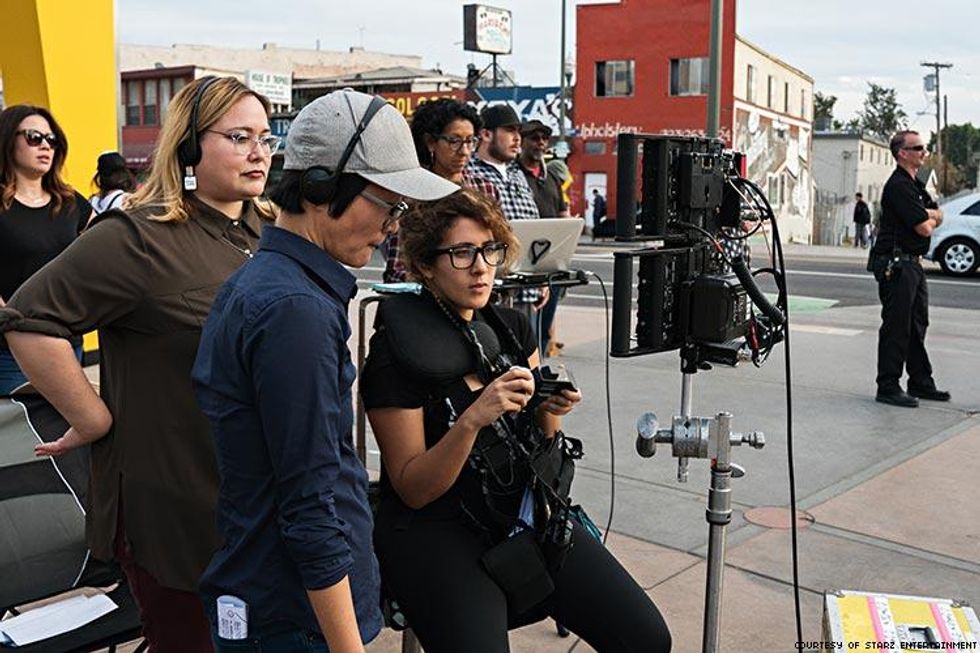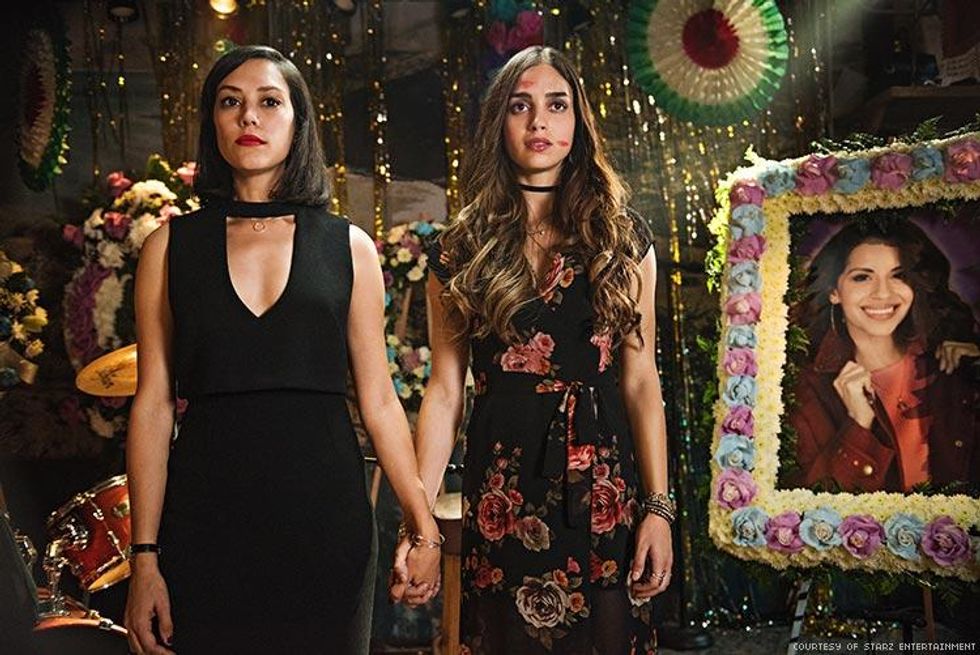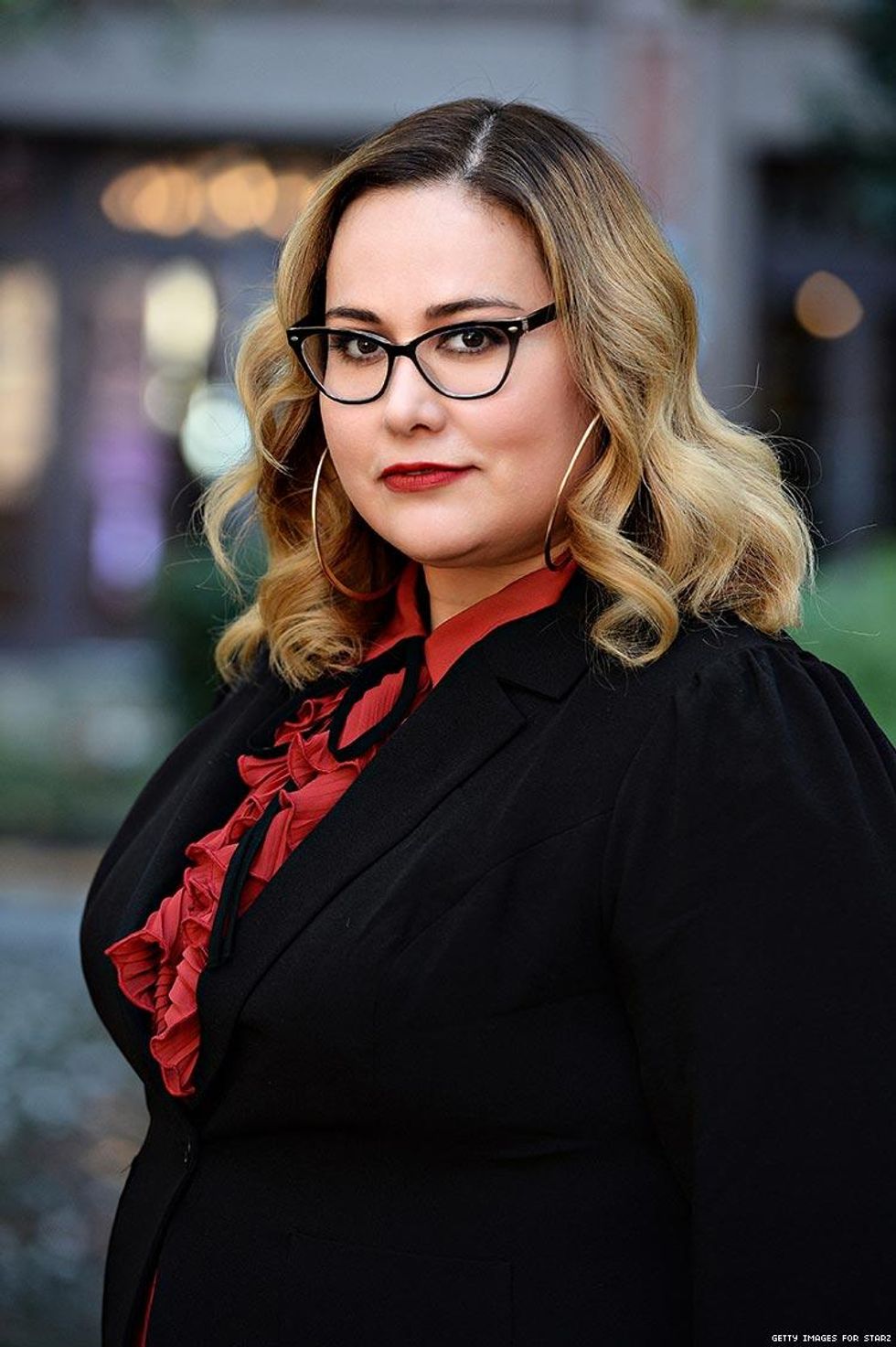It's "Sparkle Cowgirl Thursday," and Tanya Saracho is missing her boots. For the final week of production on Saracho's new series Vida, the crew has given each day its own dress-up theme. But in a rare oversight, the hyper-vigilant creator missed the memo for today. "They didn't tell me until this morning because I was sick yesterday," Saracho cries in mock devastation. "I had the hat and everything!"
She sweeps me into a welcoming hug, and we're literally off and running, darting through the busy Los Angeles streets that serve as the day's shooting location. Saracho is a hurricane, greeting each crew member in her path with a boisterous laugh and an irresistible smile. In lieu of the mandated glitter-Western regalia, she wears a gray button-up, sunflower-yellow jeans, red lipstick, and oversize glasses that frame her dark, lively eyes.
But make no mistake: Just because Saracho isn't dressed like a cowgirl doesn't mean that the rising scribe is any less eager to explore new frontiers. Saracho -- who's written for such groundbreaking shows as Looking, Girls, and How to Get Away With Murder -- has returned to television as a first-time showrunner with Vida, the story of two Mexican-American sisters who return to their childhood home in East Los Angeles to cope with their mother's death and the shocking revelations that surface in its aftermath. The series boasts an ensemble cast made up of Latinx characters -- many of whom are queer -- and eschews the usual Latinx stereotypes in favor of authentic representations rarely seen in the entertainment industry.
While Saracho is passionate about giving a voice to the unheard and delivering accurate, compelling portrayals of their lives, she also wants to ensure that she's enlisted the right people to craft those portrayals. "All our directors are either Latinx or women of color," she says. "All our department heads are female. Our DP, casting director, and second ADs are all Latina. Like Iris." She flags down second assistant director Iris Huezo, who wears a pink Wrangler shirt. "She's queer, Mexican, and dressed like a cowgirl."
"It's a cowgirl kind of day," Iris says with a laugh. Looking out over the crew -- overwhelmingly populated by women, people of color, and individuals that fall on nearly every point of the gender spectrum -- one would think that every day is a cowgirl kind of day on the set of Vida. Saracho has created an expansive, radical Hollywood utopia, where gender and racial equality are more than trending topics -- they're realities. The showrunner hopes to carve out space in the industry for more "brown, queer women," and help others avoid the struggles she experienced as a young, queer Latinx writer. For her, it's like manifest destiny -- the possibilities are endless.
Saracho began her career as a playwright in Chicago, co-founding Teatro Luna, an all-Latina theater company, in June 2000. "We didn't have any money, so we'd literally construct sets from trash and make them pretty with lights," she says, chuckling. "But Teatro Luna was the best thing I've ever done. We were writing about our lives. We trained ourselves how to tell a story on those stages."
Those stories quickly earned the troupe an audience, and the success of Teatro Luna proved there was a demand for genuine Latinx narratives. Saracho staged countless plays with her company and then eventually took her shows to bigger venues like Steppenwolf, the Goodman, and theaters across New York City. In 2012, her work caught the attention of a powerful agent who helped Saracho land her first TV writing job on Devious Maids, a drama featuring a mostly Latina cast. Finally, after years of celebrating her history and culture onstage, Saracho would be able to do the same onscreen. It seemed too good to be true -- and it was.
"The show was about Latinas, but I was the only Latina in the writers' room," Saracho explains. "On the first day of my first TV show, my co-worker turned to me and said, 'You do know you're the diversity hire, right?' The diversity hire position was a 'you're here for a quota' sort of thing. You're not supposed to speak up. I felt voiceless after that."
Saracho's dream job quickly turned into a nightmare, and the disillusioned writer became convinced there was no place for her in Hollywood. She decided to return to Chicago, but before she could pack her bags another offer came her way. The show was HBO's Looking -- a series featuring a diverse, queer cast -- so Saracho decided to give television one more shot. This time, it paid off. "It was fantastic. The showrunner, Andrew Haigh, had never done TV before, and there was no hierarchy in the room," she says. "Everyone had a voice. I was like, Oh, wait, TV can be this! I like this."
From there Saracho's career skyrocketed. She worked with Lena Dunham on Girls and on the Shondaland mega-hit How to Get Away With Murder, but her biggest opportunity was still to come. In February 2016, Starz approached Saracho to develop a new project. The network supplied her with a magazine article outlining the complexities of "gente-fication" -- a term referring to the gentrification of historically Latinx neighborhoods by younger, upwardly mobile Latinx people -- and charged her with creating a series around it. Saracho liked the idea -- the Mexican-born, Texas-bred writer could relate to many of the piece's cultural touch points. But she wanted to give the show a personal twist. "The article was just about gente-fication. It had nothing about queerness and women," she says. "So I was like, I'm gonna make it my thing."
Related | The New Starz Series Vida is Bringing Lesbian Latin Representation to TV
Vida (which premieres May 6) tackles a variety of themes -- LGBTQ discrimination, gentrification, the strength and camaraderie of Latina women -- and effortlessly weaves its credible storylines into an impressive dramatic tapestry. The show focuses on Emma (Mishel Prada), who exudes a tough exterior that masks her deep pain, and her sister Lyn (Melissa Barrera), a force of raw emotion. After their mother dies, their grieving process quickly becomes complicated when they discover that her gender-nonbinary "roommate" Eddy (played by a ferociously vulnerable Ser Anzoategui) was actually her lover. As the siblings contend with this unexpected news and re-enter their childhood community, ghosts from their past come back to haunt them. Emma's connection with a former female fling leaves her questioning her sexual orientation, Lyn gets entangled in her own thorny romantic history, and when the sisters attempt to sell their mother's local bar to developers they are deemed "gente-fiers" by Marisol, an old friend turned activist who's fighting to protect her community from displacement.
Saracho knew that in order to tell these stories faithfully, she would need to hire a formidable group of Latinx writers. Although obvious to her, the decision surprised some of her peers. "I was at an event hosted by this organization for writers, and I was talking about how I wanted an all-Latinx writers' room," she recalls, "and this well-respected woman within the industry was like, 'Why limit yourself? You should get whoever is best.' And I said, 'Wait, why can't a Latinx writer be the best writer? In fact, that is the best writer for my show.' We have this cultural shorthand, and identity plays a big part in this."
Once again, Saracho was up against the sort of bias that has long plagued Hollywood -- but this time she had the evidence to prove naysayers wrong. "Sometimes people say, 'The talent isn't out there.' But I was looking at only Latinx writers for this show, and I read 152 people in one week. The talent is out there, and it's rich and exciting."
To prove her point, Saracho guides me across a bustling Los Angeles intersection -- converted by the show's design team to resemble Cesar Chavez Avenue, the famous, Latinx-populated thoroughfare -- in search of a spot to talk with the writers on set. We settle into the production's video village, and Saracho pulls chairs into a circle. "It's like a little living room," she exclaims, surveying her work.
We're soon joined by story editor Santa Sierra, staff writer Nancy Mejia, and script coordinator Jenniffer Castillo. There is a strong familial vibe among the writers in this makeshift living room, and it soon becomes clear: It takes a video village to raise a child. "This is our baby," Saracho says, beaming at her writers. "We did the writing -- that was the first trimester. The second trimester is shooting. The third trimester is post!"
If Vida is Saracho's baby, then one of the showrunner's creative co-parents is Sierra, whom Saracho befriended before she began working on the series. "I met Santa through a Latina TV writers group. We did these brunches where at first it was basically a support group -- like, 'How's it going in your room full of white, straight, cis men?'" Saracho laughs. "But then it became a great networking group."
Sierra chimes in to share stories of her own battles, which mirror Saracho's. "I came from Narcos, where I was the only Latina writer," Sierra says. "But then I went to Vida, where everyone was Latinx, and it felt like family. Tanya's positive energy really set the tone."
Adds Mejia, "It's incredible to be in an environment where your identity is not only celebrated, but where it's essential for the storytelling."
Castillo was similarly struck by Saracho's presence and perspective within the industry. "Before I met Tanya I hadn't known another Latinx, queer writer," she says. "I literally put Tanya's contact in my phone as 'Latinx, Queer, and Badass.' Hopefully we can all eventually have our own shows and create our own Latinx writers' rooms."
For Saracho, that is all part of the plan. "We're here for Vida, but it's bigger than that. It's about building careers," she says, gesturing to the queer and Latinx cowgirls commanding her set. "I'm invested in everyone here. Somebody opened the door for me, so now I'm holding it open. I'm like, 'Come on through!' "
































